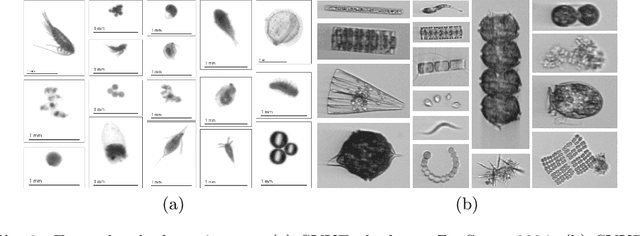Annaliina Skyttä
Open-Set Plankton Recognition
Mar 14, 2025



Abstract:This paper considers open-set recognition (OSR) of plankton images. Plankton include a diverse range of microscopic aquatic organisms that have an important role in marine ecosystems as primary producers and as a base of food webs. Given their sensitivity to environmental changes, fluctuations in plankton populations offer valuable information about oceans' health and climate change motivating their monitoring. Modern automatic plankton imaging devices enable the collection of large-scale plankton image datasets, facilitating species-level analysis. Plankton species recognition can be seen as an image classification task and is typically solved using deep learning-based image recognition models. However, data collection in real aquatic environments results in imaging devices capturing a variety of non-plankton particles and plankton species not present in the training set. This creates a challenging fine-grained OSR problem, characterized by subtle differences between taxonomically close plankton species. We address this challenge by conducting extensive experiments on three OSR approaches using both phyto- and zooplankton images analyzing also on the effect of the rejection thresholds for OSR. The results demonstrate that high OSR accuracy can be obtained promoting the use of these methods in operational plankton research. We have made the data publicly available to the research community.
 Add to Chrome
Add to Chrome Add to Firefox
Add to Firefox Add to Edge
Add to Edge